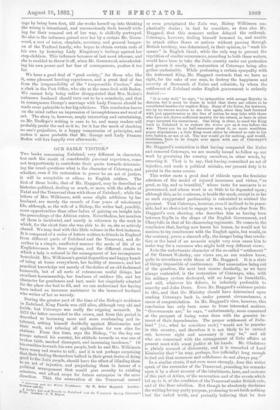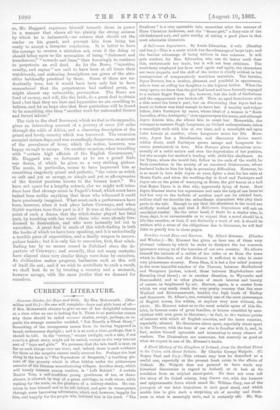OUR SABLE VISITOR.* Two books concerning Zululand, very different in
character, but each the result of considerable personal experience, come not inopportunely to contribute their quota towards determin- ing the vexed questions what is the character of Cetewayo, and whether, even if his restoration to power be an act of justice, it will be acceptable or odious to English settlers. The first of these books, that of Mr. Haggard, may be described as historico-political, dealing as much, or more, with the affairs of Natal and the Transvaal than with those of Zululand ; while the letters of Mrs. Wilkinson, with some slight additions by her husband, are merely the records of four years of missionary life, although, as the wife of a Bishop, the writer had, possibly, more opportunities than other ladies of gaining an insight into the proceedings of the African rulers. Nevertheless, her mention 'of them is incidental, and merely in reference to the work in which, for the short time she was able to do so, she so actively shared. We may deal with this little volume in the first instance. It is composed of a series of letters written to friends in England from different parts of Zululand and the Transvaal, and de- scribes in a simple, unaffected manner the mode of life of an Englishwoman in those regions, and the different straits to Which a lady is reduced in the management of her incongruous household. Mrs. Wilkinson's genial disposition and happy knack of being at home everywhere, her facility of resource, andler Practical knowledge not merely of the duties of an old-fashioned housewife, but of all sorts of extraneous useful things, her excellent horsemanship, her fondness of outdoor life, and her character for gentleness and tact, made her singularly adapted for the place she had to fill, and we can understand her having been indeed an immense assistance to the bereaved husband who writes of her so warmly.
During the greater part of the time of the Bishop's residence
in Zululand, King Panda was still alive, although very old and feeble, but Cetewayo was really the reigning monarch. In 1873 the latter succeeded to the crown, and from this period is described as becoming more and more overbearing and in- tolerant, setting himself decidedly against Missionaries and their work, and refusing all applications for new sites for stations. From this time, says the Bishop, "to the day our tbroops entered his country, his attitude towards us was one of hyoken faith, marked disrespect, and increasing insolence." Of
is cruelties towards his own people, both he and Mrs. Wilkinson have many sad stories to tell ; and it is not perhaps surprising that their finding themselves balked in their great desire of doing
tg.000ci. to the Zulu people, should have the effect of blinding them an net of injustice' and prejudicing them in favour of a political arrangement that would give security to existing missions,
direction. That
and afford scope for future enterprise in the same the annexation of the Tra-asvaal caused
Cutaway° and hit White Neighbours. By H. Elder Haggard. Londou Trnbner and Co.
Lady's VA and T'ravele in Zululand and the Tann:ant (twiny Cetetray°'s 433n. Landon J. T. Hayes.
or even precipitated the Zulu war, Bishop Wilkinson em- phatically denies ; in fact he considers, as does also Mr. Haggard, that this measure rather delayed the outbreak. Cetewayo, however, finding himself hemmed in, and unable to attack either Boers or natives without passing through British territory, was determined, in their opinion, to "wash his spears" in English blood; while the only way to prevent the repetition of similar occurrences, according to both these writers, would have been to take the Zulu country under our protection and govern it wisely, the restoration of Cetewayo being alto- gether undesirable. While professing a certain sympathy with the dethroned King, Mr. Haggard contends that we have no right, for the sake of one man, to destroy the happiness and security of thousands of Zulus and colonists, by whom the settlement of Zululand. under English government is ardently desired
"II is very well," he says, "to sympathise with savage Royalty in distress, but it must be borne in mind that there are others to be considered besides the captive King. Many of the Zulus, for instance, are by no means anxious to see him again, since they look forward with just apprehension to the line of notion he may take with those who have not shown sufficient anxiety for his return, or have In other ways incurred his resentment. One thing is clear, to send the King back to Zululand is to restore the status quo as it was before the war. There can be no half-measures about it, no more worthless paper stipulations ; a Zulu King must either be allowed to rule in his own fashion, or not at all. The war would go for nothing, and would, doubtless, have to be fought over again with one of Oetewayo's successors."
Mr. Haggard's contention is that having conquered the Zulus and removed Cetewayo, we are morally bound to follow up our work by governing the country ourselves, in other words, by annexing it. That is to say, that having committed an act of injustice, and made a political mistake, our present duty is to persist in the same course.
This writer casts a good deal of ridicule upon the feminine admirers of the model of injured innocence and virtue, "so good, so big, and so beautiful," whose taste for massacre is so pronounced, and whose word is so little to be depended upon ; although this, as he confesses, is beside the mark, except in so far as such exaggerated partisanship is calculated to mislead the ignorant. That Cetewayo, however, even if inclined to be peace- able, had no choice but to engage in war, is quite clear from Mr. Haggard's own showing, who describes him as having been between Scylla in the shape of the English Government, and Charybdis in that of his clamouring regiments. He comes to the conclusion that, having now learnt his lesson, he would not be anxious to try conclusions with the English again, but would, on the contrary, prove a staunch ally, the danger being that revolu- tion or the hand of an assassin might very soon cause him to make way for a successor who Might hold very different views.
As to the unfortunate character of the so-called " settlement " of Sir Garnet Wolselcy, our views are, as our readers know, quite in accordance with those of Mr. Haggard. It is a state of things impossible of continuance. But annexation being out of the question, the next best course decidedly, as we have always contended, is the restoration of Cetewayo, who, with his military system destroyed, will no longer be formidable, and will, whatever his defects, be infinitely preferable to anarchy and John Dunn. Even Mr. Haggard's evidence points to this, and that the Ministry should have determined upon sending Cetewayo back is, under present circumstances, a cause of congratulation. In Mr. Haggard's view, however, this conclusion has only been come to from. interested motives. "Governments are," he says, "unfortunately, more concerned at the prospect of losing votes than with the genuine in- terest of their dependencies. The proper settlement of Zulu- land" [ix., what he considers such] "would not be popular in this country, and therefore it is not likely to be carried out, however right and necessary it may be," and all who are concerned with the arrangement of Zulu affairs at present meet with scant justice at his hands. Mr. Gladstone is plainly accused of dishonesty, and it is remarked of Lord Kimberley that "he may, perhaps, live (officially) long enough to find out that meanness and selfishness do not always pay."
In a similar strain, if not even more strongly, does this writer speak of the surrender of the Transvaal, preceding his remarks upon it by a short account of the inhabitants, laws, and customs of this part of Africa, of the annexation and of the events which led. up to it, of the condition of the Transvaal under British rule, and of the Boer rebellion. But though he absolutely disclaims the writing for any party purpose, professing to set forth nothing but the naked truth, and probably believing that he does so, Mr. Haggard expresses himself towards those in power in a manner that chews all too plainly the strong animus by which he is influenced,—an animus that should set the reader on his guard, and prevent him from being too ready to accept a foregone conclusion. It is better to have the courage to reverse a mistaken act, even if the doing so should bring upon us the accusation of being " dishonest and treacherous," "cowards and liars," than knowingly to continue to perpetrate an evil deed. As for the Boers, "injustice, cruelty, and rapine" are said to have been at all times their watchwords, and sickening descriptions are given of the atro- cities habitually practised by them. Some of these are un- doubtedly true, but it would have been only fair to have remembered that the perpetrators had suffered great, we might almost say unbearable, provocation. The Boers are fond of money, and will, like the Irish, do a great deal to obtain land ; but that they are liars and hypocrites we are unwilling to believe, and let us hope also that Boer patriotism will be found to be something else than "another word for unbounded licence and forced. labour."
The visit to the chief Secocceni, which we find in. the appendix, gives an interesting account of a journey of some 250 miles through the wilds of Africa, and a charming description of the grand and lovely country which was traversed. The excursion occupied sixteen days, and was exceedingly dangerous, on account of the prevalence of fever, which the writer, however, was happy enough to escape. On another occasion, when travelling with "certain high officials of the English Government," Mr. Haggard was so fortunate as to see a grand Zulu war dance, of which he gives us a very striking picture. The music, in particular, seems to have impressed him as something singularly grand and pathetic, "the voices so weird, so soft and yet so savage, so simple and yet so all-expressive of the fiercest passions known to the human heart." We have not space for a lengthy extract, else we might well intro- duce here that strange scene in Pagadi's kraal, which must have indeed been unlike anything that those who witnessed it could have previously imagined. What must such a performance have been, however, when it took place before Cetewayo, and when 30,000 warriors bore their part in it P It was at the culminating point of such a drama that the witch-finder played her fatal part, by touching with her wand those who were already fore- doomed to destruction, and who were instantly led out to execution. A great deal is made of this witch-finding in both the books of which we have been speaking, and it is undoubtedly a terrible piece of superstition, and a deadly weapon in unscru- pulous hands ; but it is only fair to remember, first, that witch- finding has by no means ceased in Zululand since the de- parture of Cetewayo ; and secondly, that not many centuries have elapsed since very similar things were done by ourselves. As civilisation makes progress, barbarism such as this will of itself die out ; and if we wish to contribute to such a result, we shall best do so by treating a country and a monarch, however savage, with the same justice that we demand for ourselves.































 Previous page
Previous page